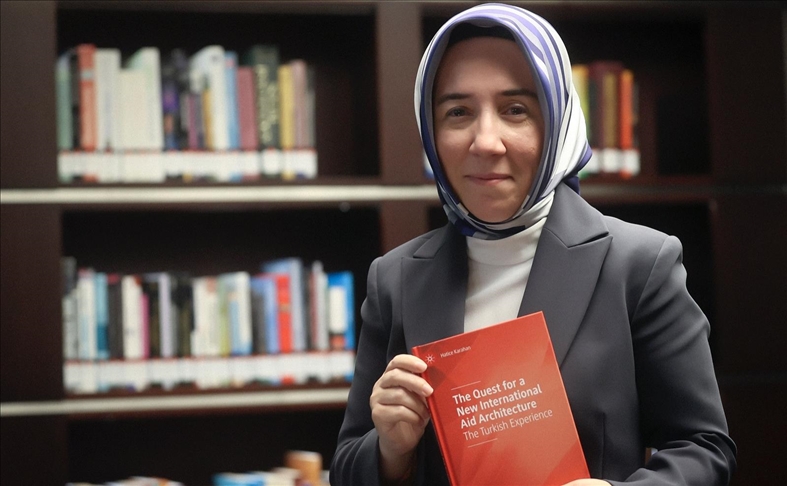'Afghanistan case shows why world in need of new int'l aid architecture'
Learning from failed cases, inspiring practices, world must reshape development cooperation, says chief presidential aide

ANKARA
The international community should reshape development cooperation architecture, learning from failed cases, such as what happened in Afghanistan, said Hatice Karahan, senior economic advisor to Turkey's president and a visiting scholar at Harvard University.
"Despite a huge amount of Western-majority foreign aid -- and we're talking about billions of dollars -- the people of Afghanistan have lingered in a deplorable state with regard to their basic needs for development," Karahan told Anadolu Agency.
The author of a book titled "The Quest for a New International Aid Architecture" explained that most of the aid to Afghanistan was spent on relief, military assistance, and services needed by international officials.
For example, the US alone, channeled over $130 billion to Afghanistan between 2001 and 2020, 70% of which was military spending, she said.
"Only a small amount of the international aid in question was used for purposes of development such as infrastructure, production, schools, and hospitals," she underlined.
"Today over half of the population live below poverty line", she said, adding "food security has also become a critical issue facing the Afghan people."
Within this process, she noted, the state became dependent on foreign aid and did not fix the economy's fragile structure. "And we can describe this situation as a vicious cycle," she added.
'World needs proper burden-sharing'
According to Karahan, the international community has carried out aid activities for decades but certain persisting humanitarian problems and cases of underdevelopment in various regions warrant a serious re-examination.
A UN General Assembly resolution adopted in 1970 set a goal for advanced countries to provide at least 0.7% of their national income to developing nations as official development assistance.
"However, only a few countries have achieved this target so far," said Karahan, adding that this was "the first disappointing fact and tells us that the world needs a proper burden-sharing by the providers of development cooperation."
Karahan highlighted successful development cooperation also depends on the quality of funding.
History has witnessed numerous aid projects that ended disappointingly, she highlighted, adding that "the outcomes of such initiatives have been described with such concepts as dead aid, counterproductive aid, and aid dependence."
Turkey's approach to int'l cooperation
On the other hand, she said, the world also witnesses some positive, inspiring stories, such as that of Turkey.
Turkey's international cooperation differs from the general approach of the international community, explained Karahan."It has not only been active in providing humanitarian aid but also in development assistance."
In recent years, the country achieved record-breaking levels in the OECD group by mobilizing over 1% of its gross national income towards official development assistance, she added.
"And given that a majority of high-income countries have not reached the 0.7% threshold yet, Turkey, among a few other countries like Sweden, Norway, and Luxembourg, sets a good example here."
Another factor that sets Turkey apart from the general outlook is the design and delivery of its foreign assistance, she noted.
Cooperation activities should give precedence to the recipient's needs and benefits while favoring untied conditions, she added. "Turkey's cooperation model considers such ideal requirements in designing aid activities, particularly in terms of genuineness, desired outcomes, and speed."
Turkey's cooperation activities in Africa
In Africa, said Karahan, Turkey's main focus is helping the least-developed countries on the continent.
"Over 80% of Turkey's official development assistance to Africa goes to the Sub-Saharan region," said the economist.
She noted that this was particularly important for the self-sufficiency of recipient countries in the long run.
The region, which has received the largest share of international aid for decades, still struggles with unacceptable humanitarian conditions, she said. "A prominent aspect of the Turkish cooperation in Africa is combining humanitarian and development assistance within a holistic model, wherever needed."
Learning from pandemic
Karahan also said that both bilateral and multilateral aid flows played an encouraging role in tackling the novel coronavirus pandemic.
Statistics from 2020 highlight an increase in foreign aid, driven by new spending mobilized to help countries deal with the COVID-19 crisis, she said. "However, a nontrivial portion of the increase in official development assistance in 2020 came from the rising volume of loans," she said.
More importantly, the terms of loans for the least-developed countries have continued to worsen. This is not encouraging, she added.
The global vaccination initiative is still underfunded, she noted, saying that vaccination programs and investments in healthcare must be considered global public goods.
That is why foreign aid should come into play more than ever for countries in need, she said.
"Now, it is time for the international community to learn lessons from the pandemic and to finally walk the talk."
Anadolu Agency website contains only a portion of the news stories offered to subscribers in the AA News Broadcasting System (HAS), and in summarized form. Please contact us for subscription options.


